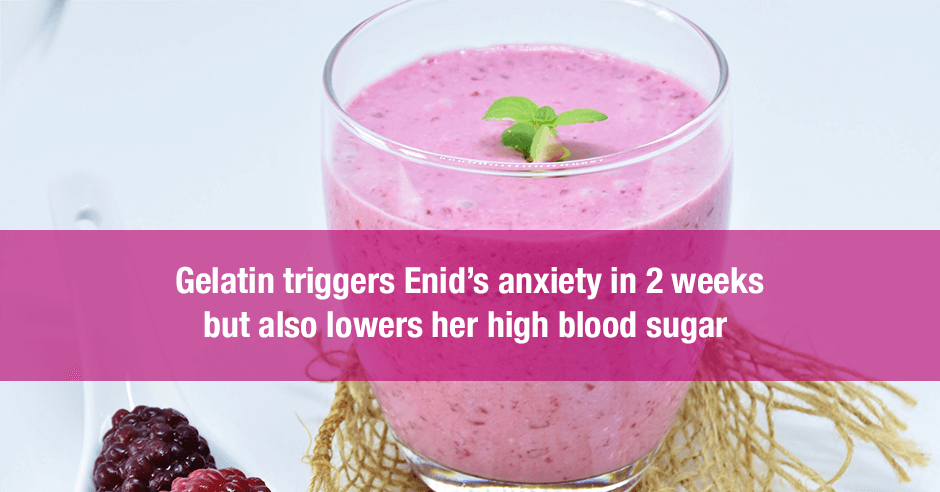
Are you aware that collagen and gelatin lower serotonin and may increase your anxiety and depression and worsen sleep? I blogged about this in 2017 and how susceptible individuals who are prone to low serotonin need to be aware of this and use 5-HTP or tryptophan to counter these effects. (You can read that blog here: Collagen and gelatin lower serotonin: does this increase your anxiety and depression?)
I’m sharing an example today from one of the many comments on the above blog as a reminder or in case this is new to you. It’s not well-recognized as being an issue even amongst practitioners and producers of collagen. This is also one of my most commented-on blogs so it’s clearly a big issue. And gelatin and collagen continue to become more and more popular.
As a reminder, gelatin is derived from collagen: when collagen breaks down, it becomes gelatin. Also, collagen and gelatin are an excellent source of these amino acids: proline, glycine, glutamine and arginine, but they do not contain the amino acid tryptophan, so they have the potential to lower serotonin levels.
Tryptophan-depletion studies have been done for years – using a tryptophan-deficient amino acid mixture – as a way to study the relationship between low serotonin and depression.
More recently, collagen and gelatin are being used in these tryptophan-depletion studies because they do not contain the amino acid tryptophan. This paper, Pharmacokinetics of acute tryptophan depletion using a gelatin-based protein in male and female Wistar rats, summarizes what we find in a number of studies that use gelatin for the purpose of lowering serotonin levels (in order to study the relationship between serotonin and mood issues):
The essential amino acid tryptophan is the precursor of the neurotransmitter serotonin. By depleting the body of tryptophan, brain tryptophan and serotonin levels are temporarily reduced.
What does this mean? If you consume gelatin or collagen, you end up depleting the body of tryptophan and serotonin levels are reduced for a short time. This can cause the classic low serotonin symptoms of anxiety, worry, panic attacks, fears, phobias, insomnia, PMS, afternoon and evening carb cravings, TMJ, PMS and even anger issues and obsessions/ruminations.
For Enid, adding gelatin to her weight-loss shake powder triggered the anxiety she used to experience:
I wanted to give you a sincere thanks for all the work you’ve done on this blog and for studying collagen and serotonin. I have been taking quite a bit of gelatin because I started a medically supervised weight-loss program a month ago and was adding the shake powder to gelatin to thicken it. I have a long history of anxiety but it has been better for several years. However, I have been really concerned because my heart hurts with anxiety like I used to have. So your article and the follow up comments have helped me since I would have continued to eat a lot of it But now I will stop. So thank you.
Edid also shared how the gelatin she was consuming lowered her blood sugar in 2 weeks:
What’s interesting is in 2 weeks of being on the diet and eating a lot of gelatin my glucose went from 190 (which is diabetes) to 113 which is perfectly normal. I’ve read that collagen lowers blood sugar. So hopefully it will stay down even after stopping eating gelatin.
I found it very interesting to learn about Enid’s lowered glucose and that it went down so much in just 2 weeks.
So I went looking into the research and found this paper, Therapeutic effects of marine collagen peptides on Chinese patients with type 2 diabetes mellitus and primary hypertension, stating that marine collagen “significantly reduced levels of fasting blood glucose.” The study concluded that marine collagen:
may benefit glucose and lipid metabolism, insulin sensitivity, renal function and hypertension management in Chinese patients with T2DM [type 2 diabetes] and hypertension.
This research is new to me and is a good reason to continue with gelatin or collagen and address why it’s causing her anxiety to ramp again after just 2 weeks.
My message in this blog post – Collagen and gelatin lower serotonin: does this increase your anxiety and depression? – is not to stop gelatin or collagen, but rather help you to figure out if your consumption of collagen or gelatin is causing your anxiety, depression or insomnia (or other low serotonin symptoms), or making it worse.
Once you have made this connection then you need to figure out what the mechanism is. The fact that the consumption of collagen and gelatin lower serotonin is one possible factor for susceptible folks. The easiest way to figure out if it is low serotonin for you is to do a trial of tryptophan or 5-HTP while continuing to consume gelatin or collagen and see if your new symptoms resolve. (You can read more about that here: Tryptophan for the worry-in-your-head and ruminating type of anxiety)
I would love your feedback. Do you use gelatin or collagen regularly i.e. daily or weekly? And why do you use it? How do you use it and what benefits do you notice?
Have you noticed an increase in anxiety or worsening of mood or any of the other low serotonin symptoms? Do you take tryptophan or 5-HTP to offset the fact that gelatin or collagen doesn’t contain any tryptophan and does that help?
Have you done the off/on test with collagen/gelatin and tryptophan or 5-HTP – and what was the outcome?
Have you found collagen or gelatin helped to lower your high glucose levels?
Feel free to post your questions here too.